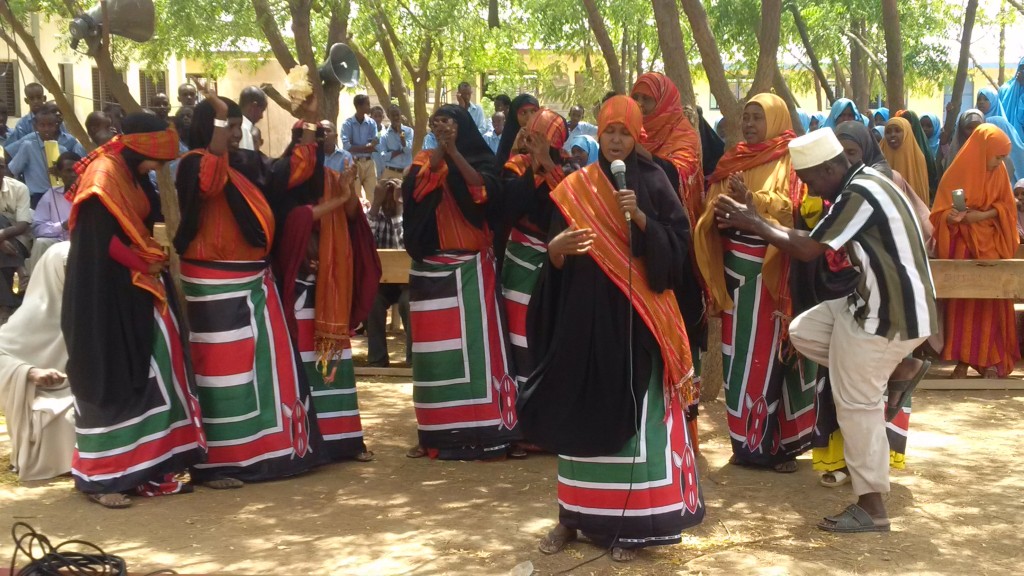Peace celebrations in North Kenya – Former enemies dance side by side
UN International Peace Day was celebrated widely in Northern Kenya. Celebrations included important symbolism, like Turkana and Pokot Members of Parliament dancing side by side, and people in Garissa at the same time commemorating the College attack and its 147 victims.
Garissa for peace
A mention of the word peace is met with different reactions in Garissa, but clearly everyone here appreciates the importance of peace. Garissa County is home to one of the largest refugee camps in the world, hosting hundreds of thousands of refugees fleeing violence that has lasted for decades in the Horn of Africa country of Somalia.
More recently, residents witnessed a terror attack at the Garissa University College that left 147 people dead. The impact has been felt across town with many sectors including healthcare, education and business affected negatively as many investors and skilled workers have fled and relocated from the county. It is against this background that hundreds of residents gathered to join the world in commemorating the United Nations’ International Day of Peace on Monday September 21, 2015 under the theme Partnerships for Peace – Dignity for All.
This was possible through the facilitation of FCA through the Regal-IR Peace Programme. This year’s celebrations brought together several actors who joined locals in the day’s activities including peace songs, dances, and skits by women, youths and peace ambassador club pupils drawn from Iftin and Young Muslim Primary Schools in Garissa.
Religious leaders from both Christian and Muslim faiths also took to rally their faithful to embrace each other regardless of ethnicity or religion. Religious leaders led the gathering in observing a moment of silence, dubbed moment of peace, in remembrance of the 147 victims of the college terror attack and the tens of lives that have been lost in inter clan clashes.
Marsabit
FCA joined the County Government and the people of Marsabit to celebrate this day in the small town of Forole at the border of Kenya and Ethiopia, a region which previously experienced fatal cross border inter-tribal clashes between two major tribes living in Marsabit. To support women’s involvement in peace building and conflict transformation, FCA facilitated the Upendo women’s group to deliver peace messages through peace songs and dances aimed at changing the negative attitudes, stereotypes, prejudices and ethnocentrism of communities, and promote peaceful coexistence.
Composed of all the major ethnic groups living in Marsabit including the Gabra, Borana, Rendile/Samburu Burji and Turkana, each dressed in their traditional regalia, the group sang about previous inter-tribal wars that led to loss of lives and livelihood evoking painful memories that the whole county vowed never to re-experience again, instead thriving for peaceful coexistence. Marsabit County Governor, His Excellence Amb. Ukur Yatani attended the celebration.
Isiolo
FCA joined peace stakeholders, the county government, the national government and the people of Isiolo to mark this day. The celebration took place at the Isiolo stadium where the deputy governor H.E Mohammed Gulled was the chief guest. In peace building and conflict resolution process, FCA supports the need of women’s participation, and for this reason facilitated Lorian women’s group from the Ngare-Mara ward to deliver peace messages through peace songs.
All speakers warned politicians in Isiolo County against inciting communities to fight each other. Inter-faith Organisation chairman Ahmed Seth said cases of pastoral conflicts that have bedevilled the county have been attributed to political incitement.
“It is unfortunate that both Turkana and Samburu communities engage in fights when the Vision 2030 flagship projects are set to begin in the county,” Seth said at Isiolo stadium during the celebration.
He also said it is important that leaders from warring communities meet regularly to resolve their differences and promote peaceful coexistence. He also mentioned to the community that the religious leaders are working very closely with peace stakeholders to mitigate the current Turkana and Samburu conflicts. The Deputy county commissioner, Mr Ruto, who represented the county commissioner, also called on the pastoral communities to embrace dialogue instead of resorting to uncouth ways of expressing their grievance.
Turkana
Turkana County celebrated this festival in a unique and elaborate way: by writing it down in the Lokiriama Peace Accord.
Lokiriama is a location in Loima, a Sub County of Turkana. The Peace Accord was created in 1972, as the communities of Matheniko in Uganda, and Turkana in Kenya came to an agreement after a peace dialogue. They agreed to end their conflict and promote peace between the Karamojon and Turkana communities. After unconditional consent from the Turkana community, elders from the two communities met at Lokiriama and buried hatchets of violence to mark a new beginning of peace. This accord has since been commemorated every year during the International Day of Peace.
The chief guest for this year’s commemoration was Bishop Cornelius Korir of the Catholic Diocese of Eldoret. Bishop Korir is a respected personality in the region. He has been involved in the peace process between the Turkana and Pokot Communities for the past year, facilitated by Finn Church Aid through the REGAL-IR project funded by USAID.
In collaboration with Turkana County, Finn Church Aid (FCA) as the lead organisation facilitated 75 representatives of peace committees from Turkana South; the wards of Lobokat and Kaptir, and 15 Peace elders from West Pokot County. The peace groups met and united as one team to celebrate the international peace day, and the five-month long peaceful coexistence between the Turkana and Pokot communities.
Text and images: Charles Apondu, Vincent Omunyin, Umuro Sora, Edel Mitei
Finn Church Aid (FCA) is implementing the peace component of a larger programme “Resilience and Economic Growth in the Arid Lands – Improving Resilience” (REGAL-IR) by the consortium led by Adeso, African Development Solutions and funded by USAID.
